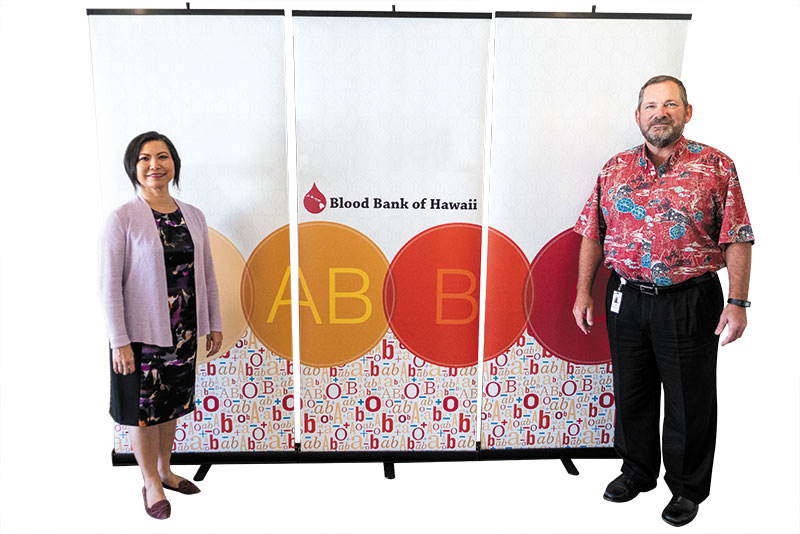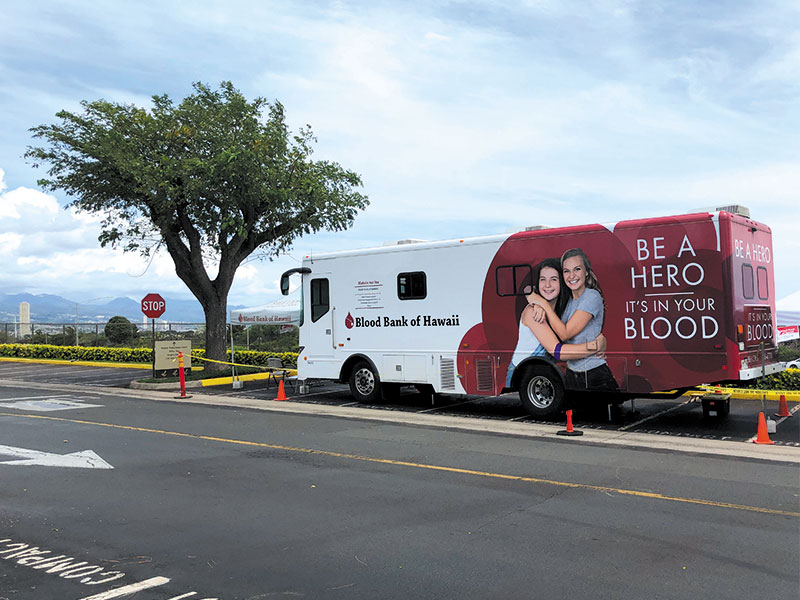It Takes All Types

Blood Bank of Hawai‘i CEO Dr. Kim-Anh Nguyen and COO Todd Lewis encourage everyone to give blood if they can.
Blood drives might look a little different right now, but the aim of Blood Bank of Hawai‘i remains the same: to save lives.
There’s a constant need for blood in health care systems around the world, and that’s especially true in Hawai‘i. The state’s location in the middle of the Pacific makes importing blood difficult and costly, but thanks to dedicated donors, about 75-80 percent of Hawai‘i’s blood supply comes from local communities and the “lifesaver clubs” — aka businesses, organizations and groups — that sponsor drives throughout the year.
“We are reliant on blood drives,” says Dr. Kim-Anh Nguyen, CEO of Blood Bank of Hawai‘i. “Twenty percent come from the neighbor islands, and the other part of that 75-80 percent comes from drives at churches, banks, community centers and malls, and 13 percent comes from our schools.”
So, when COVID-19 first reared its ugly head, it put blood drives in jeopardy. Minor disruptions soon turned more drastic with businesses around the state closing and events being scrubbed.
This included blood drives.

In early March, Blood Bank of Hawai‘i was getting a drive cancellation once every few days. By mid-March, it was seeing one cancellation a day. Then, it was one every hour.
“It became a fingernail-biting exercise,” explains Nguyen.
That’s when Blood Bank of Hawai‘i decided to change its current model of group-sponsored collection drives.
“We had to create new goals for ourselves,” she adds.
Instead of relying on sponsor-driven sites, Blood Bank of Hawai‘i set up pop-up locations — open seven days a week across the island — with the help of community partners.
To say that people came out in support would be an understatement. After Blood Bank of Hawai‘i announced its pop-up donation centers (see breakout box on page 17) nearly 1,000 appointments were booked for the next week.
“We went from a loss of 80 percent of Hawai‘i’s blood supply to almost where we were,” says Nguyen. “It was just amazing.”
But, there was a slight snag. When stay-at-home orders were issued, many donors were left wondering if they would be able to leave their homes to give.
“We had to quickly call the mayor’s office and be reassured that it’s OK that donors in the act of donating blood were not going against any orders,” Nguyen explains.
As fate would have it, that tiny complication would change the outlook on what blood donation means for the nation. According to Nguyen, the governor’s order referenced a document by the U.S. Department of Homeland security that lists what individuals make up the essential and critical workforce.
“We had never thought of blood donors as health care workers,” she admits. “In addition to doctors, nurses, paramedics, there’s a hidden part-time volunteer health care force that is critical to the state of Hawai‘i — blood donors.”
And nearly everyone can join this necessary task force. (Visit bbh.org/covid-19 to see a list of requirements.)
“We are appointment-only,” explains Nguyen. “We are ensuring physical distancing so it’s safe for donors and staff.”
Blood Bank of Hawai‘i is also looking for convalescent plasma donors to help those diagnosed with the coronavirus (see the breakout box below). Those who have had a documented positive test for COVID-19 and are now in recovery can donate their plasma to help hospitalized patients both here in Hawai‘i and on the mainland.
For now, Blood Bank of Hawai‘i is remaining flexible with the changes, but its main message remains the same.
“If you’re healthy, please make an appointment to donate blood,” says Nguyen. “Just because we might be coming out of shelter-in-place doesn’t mean the blood supply is safe.”
For more information, visit bloodbanktough.org.
PLASMA, PLEASE
Those who have been diagnosed and recovered from COVID-19 (symptom-free for at least 28 days) can help save someone’s life by donating their convalescent plasma. Donations like this are being made all over the nation, but Hawai‘i is the first to have a statewide coalition to spur on the effort. “We are still in the very early stages, but we’ve already treated two local patients,” says Dr. Kim-Anh Nguyen, CEO of Blood Bank of Hawai‘i.
According to Blood Bank of Hawai‘i, convalescent plasma has traditionally been used as an early treatment for many infectious diseases. The nonprofit has partnered with The Queen’s Health Systems, Hawai‘i Pacific Health, Kaiser Permanente Hawai‘i, state Department of Health, University of Hawai‘i John A. Burns School of Medicine and other clinical laboratories to make this treatment available to patients hospitalized with COVID-19.
“We wanted to do things as a group instead of ‘me vs. you,'” explains Nguyen. “We are proud to partner with Hawai‘i’s leading medical providers to contribute to a national study that makes this experimental treatment option a reality for our local community.”
Donations for the COVID-19 convalescent plasma program are only being accepted at Blood Bank of Hawai‘i’s Dillingham center. Qualifying individuals interested in donating their convalescent plasma can email covidplasma@bbh.org or call 848-4706.
POP-UP DONATION CENTERS
DILLINGHAM HEADQUARTERS
(May and June)
Monday-Thursday, 6:30 a.m.-6:30 p.m.
Friday-Sunday, 6:30 a.m.-4:30 p.m.
YOUNG STREET DONOR CENTER
(May and June)
Monday-Thursday, 6:30 a.m.-6:30 p.m.
Friday-Sunday, 6:30 a.m.-4:30 p.m.
KROC CENTER HAWAI‘I (May)
Thursday, 6:30 a.m.-6:30 p.m.
Friday and Saturday, 6:30 a.m.-4:30 p.m.
WALMART KAPOLEI (June)
Thursday, 6:30 a.m.-6:30 p.m.
Friday and Saturday, 6:30 a.m.-4:30 p.m.
WAIKELE CENTER (May and June)
Monday-Wednesday, 6:30 a.m.-6:30 p.m.
Sunday, 6:30 a.m.-4:30 p.m.
KAILUA TOWN CENTER (May)
Monday-Wednesday, 6:30 a.m.-6:30 p.m.
Sunday, 6:30 a.m.-4:30 p.m.
CASTLE MEDICAL CENTER (June)
Monday-Wednesday, 6:30 a.m.-6:30 p.m.
Sunday, 6:30 a.m.-4:30 p.m.
KĀNE‘OHE BAY SHOPPING CENTER
(May and June)
Thursday, 6:30 a.m.-6:30 p.m.
Friday and Saturday, 6:30 a.m.-4:30 p.m.
Call 848-4770 or visit bloodbanktough.org to make an appointment. For more information, visit bbh.org/covid-19.





